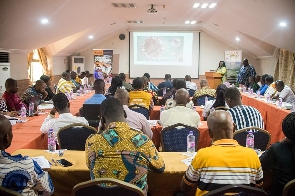 Stakeholders at the meeting held in Kumasi
Stakeholders at the meeting held in Kumasi
A baseline study report on Integrated Landscapes Approaches and Investments in Sustainable Land Management conducted by J.E Lemuel Company on the European Union funded “Landscapes and Environmental Agility across the Nation”- LEAN Project has been reviewed by stakeholders recently in Kumasi.
The one-day meeting brought together representatives from Department of Agriculture, National Commission for Civic Education (NCCE), The Commission on Human Rights and Administrative Justice (CHRAJ), Ministry of Lands and Natural Resources (MLNR), TCDA, Forestry Commission (RMSC & FSD), MMDAs Development Planning Officers, LUSPA (land use and spatial planning authority) and others.
Madam Abena Woode, the Consortium Lead updated the group on all the project implementations and the progress so far.
She however identified inefficient self- sustaining landscape governance model for scale up, inadequate effective tools, resources, and incentives to drive aligned action and Limited capacity and knowledge to act on broader scales as some of the challenges.
According to Emmanuel Bawuah Antwi, a member of Rainforest Alliance team, one of the implementers of the LEAN Project, the report was to provide a clear understanding of the current social structures, smallholder livelihoods and biodiversity status, particularly regarding land use and productive activities, threats to the preservation of the natural resource base of the landscapes (including forests), and the current mitigation strategies used to combat climate change.
He indicated this will provide valuable insight that would guide the project implementers to design appropriate interventions to effectively address the challenges.
LEAN is a four-year project (from 2020-2024) funded by the European Union. The project aims to directly support national efforts to conserve biodiversity, improve the livelihoods of small-scale farmers, build climate resilience, and reduce emissions from land-use changes across Ghana’s savannah, high forest, and transition zones.
Acting Regional Director for Land Use and Special Planning Authority, Nana Kusi Nsiah, speaking on what their outfit is doing on the project said they undertake planning functions, enforce the planning rules and regulations, ensure conformity between land uses and allocation for uses which conforms to the potential of that place so they are committed to providing maps for the project to help the lands be easily identified and interpreted.
He said the composition of the stakeholders was a good mix of stakeholders that should validate the report and however urged the implementers of the project to conduct a capacity building training for the various governance institutions to help deliver on their mandate as well as help provide some logistics such as landscape plotters, GPS Devices and others.
The LEAN project is being implemented by a consortium of four partners including the Rainforest Alliance (RA), Tropenbos Ghana (TPG), EcoCare Ghana, and World Vision Ghana, and working closely with the EU Delegation, private sector, and local communities.